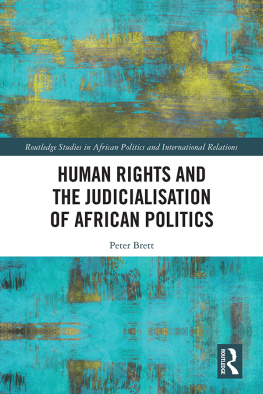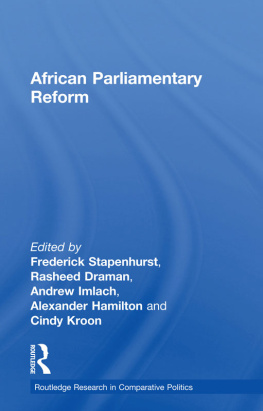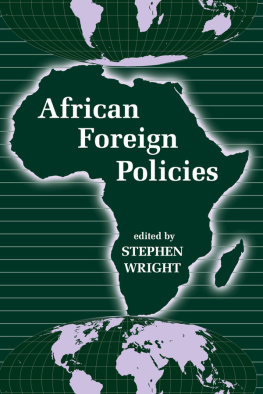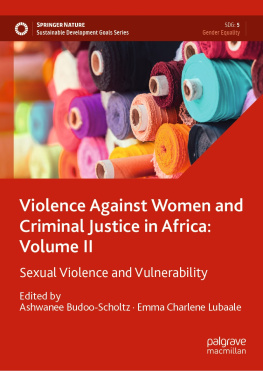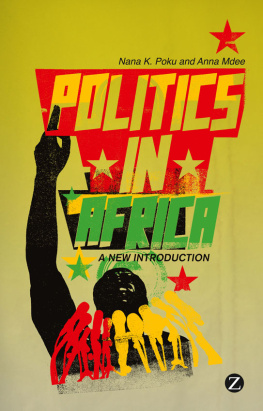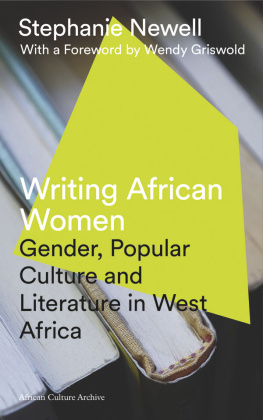For Africa's girl child: may she find her rightful place in the social and economic development of her vibrant and gifted continent.
'The real challenge and test of the success of the Fourth World Conference on Women is what happens afterwards'
Patricia . Licuanan Chairperson of the UN Commission on the Status of Women
Maintaining the Momentum of Beijing
The contribution of African gender NGOs
Edited by
Nana Araba Apt
Centre for Policy Studies University of Ghana
Naana Agyemang-Mensah
Associates in Development Accra, Ghana
Margaret Grieco
The Business School University of North London
First published 1998 by Ashgate Publishing
Reissued 2018 by Routledge
2 Park Square, Milton Park, Abingdon, Oxon, OX14 4RN
711 Third Avenue, New York, NY 10017, USA
Routledge is an imprint of the Taylor & Francis Group, an informa business
Copyright N.A. Apt, N. Agyemang-Mensah and M. Grieco 1998
All rights reserved. No part of this book may be reprinted or reproduced or utilised in any form or by any electronic, mechanical, or other means, now known or hereafter invented, including photocopying and recording, or in any information storage or retrieval system, without permission in writing from the publishers.
Notice:
Product or corporate names may be trademarks or registered trademarks, and are used only for identification and explanation without intent to infringe.
Publisher's Note
The publisher has gone to great lengths to ensure the quality of this reprint but points out that some imperfections in the original copies may be apparent.
Disclaimer
The publisher has made every effort to trace copyright holders and welcomes correspondence from those they have been unable to contact.
A Library of Congress record exists under LC control number: 98072625
ISBN 13: 978-1-138-32430-5 (hbk)
ISBN 13: 978-1-138-32434-3 (pbk)
ISBN 13: 978-0-429-45094-5 (ebk)
Contents
Margaret Grieco
Voices from African Women Workshop
Dr Naana Agyemang-Mensah
Dr (Mrs) Nana Konadu Agyeman Rawlings
Dr Mary Grant
Dr Naana Agyemang-Mensah
Lucia Quakye
Mrs Rebecca Osei-Boateng
Professor Nana Araba Apt and Dr Naana Agyemang-Mensah
Honourable Miria Matembe
Winifred Chege
Lorraine Osei-Mensah
Beth Mugo
Dr Pauline Biyong
Esther Susuyu Mbanyiman
Professor Nana Araba Apt
Right Honourable Madame Diallo Hadja Acha Bah
Margaret Grieco and Professor Nana Araba Apt
Margaret Grieco and Stephen Denning
To the very many women who brought their efforts and commitment to each and every stage of producing the evidence and recommendations contained in this book, a hearty thank you for your trouble. Thanks to Ishrat Husain, Division Chief of Human Resources in the Africa Region of the World Bank for providing the support and institutional know-how on how to access resources for networking by African women - without this support, the task would indeed have been a daunting one. Thanks to the administrators of the Africa region of the World Bank who battled with a host of communication difficulties to get the monies out to the field in order to permit networking activity to proceed. Thanks also to those many NGOs who participated in bringing this work together - under-financed and over-burdened, these organisations gave of their best in setting up fora in which African women could raise their voices on development in Africa and have them recorded. Jean Louis Sarbib, Vice President of the Africa Region provided welcome and visible support for this exercise when it hit difficulties and appreciation of its products when feedback was a necessary moral tonic. Professor Paul Collier of the Centre for the Study of African Economies, University of Oxford provided support and encouragement as this hope-filled task went through its final stages. To Haddy Sey, Independent Consultant, Washington DC, who kept track of all the outputs of the networking activities and transported them to Ghana for the network workshop, our thanks. Our deepest thanks to Pat FitzGerald who by her diligence and skill brought this volume to its published form. Thanks to our children, our partners and our parents, all of whom gave support as we took the time to raise our voices in enabling the voices of others. Finally, to the Swiss Agency for Development and Cooperation Trust Fund which provided the funds to conduct the research and coordination for this book, our profound thanks.
It gives me great pleasure to introduce this timely volume, which attests to the dynamism, resourcefulness, and resilience of women in Africa. In this collection of essays, African women, in their own voices, rightly call for development by donors and policy-makers of explicit gender strategies and protocols for the inclusion of women in all aspects of the business of development. It is a call we must all hear and heed. The Africa Region of the World Bank launched the Voices from African Women initiative before the Beijing Conference as a means to increase the influence of African women in mainstream development policy and Bank work, and we acknowledge with gratitude the financial support provided by the Swiss Agency for Development and Cooperation.
This volume should indeed help to amplify women's voices, enabling their own distinct perspectives and priorities to be heard and to shape the future direction of development policies. It also suggests ways to harness advances in information technology and communications to support gender-inclusive development. In this respect, the volume raises new challenges in the ways we think about access rights for women in Africa. The World Bank intends to be responsive. As part of the follow up to the Beijing Conference, the World Bank's Africa Region prepared a Regional Gender Action Plan, which has strengthening women's participation at all levels as one of its key strategic objectives. The Voices speaking in this volume will help to enrich this - and other - efforts and to ensure that women are truly recognised as the full actors they are in building better lives for the people of Africa. I look forward to an even richer dialogue and deeper partnership.
Jean-Louis Sarbib
Vice President for Africa
The World Bank
MARGARET GRIECO
PROFESSOR OF ORGANISATION AND DEVELOPMENT MANAGEMENT, UNIVERSITY OF NORTH LONDON
Voices, Voicing and Empowerment: A Move Away from the Welfare Paradigm
Beijing was the culmination of a vast amount of effort by women's organisations and women all over the world to move the debate on gender away from a simplistic focus on women's reproductive health and fertility issues to a more holistic approach on women's situation of compound disadvantage and the need for their empowerment. The scale of NGO sector activity in Beijing testified to women's unwillingness to continue to be represented through the voices of male officialdom: it was a claim for a direct voice by women in the affairs which concern them. This volume has as its goal the raising of the voices of African women in articulating and determining what the gender goals for Africa should be. The volume is not an easy read: there are often many contextual details shared by the authors in this volume which will not be shared by the readership of this volume. But those parts that we do not understand raise for us an awareness of the task that we have to undertake and the part that we have to play in gaining the knowledge necessary in order to be able to hear accurately what these African voices are saving to us.


